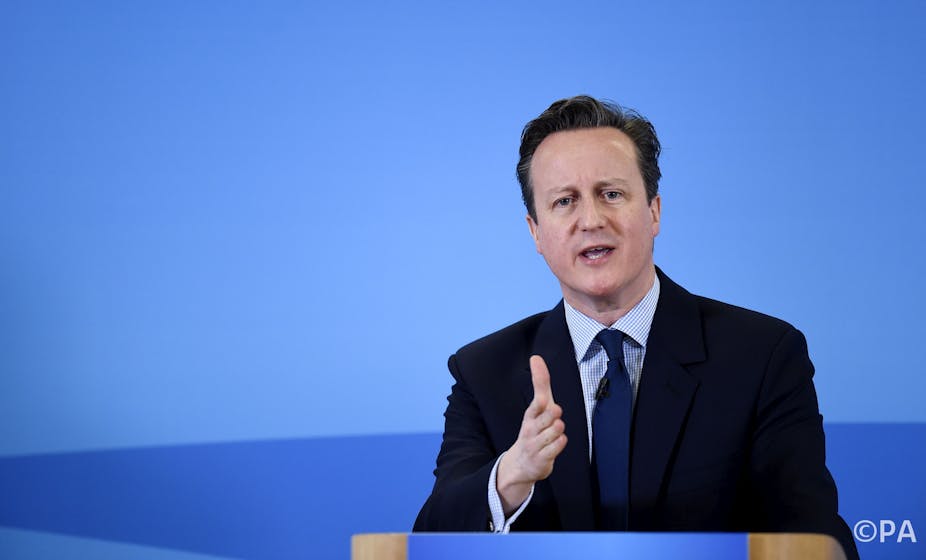After countering broadcasters’ plans for three televised leaders’ debates with a proposal for one, 90-minute session involving up to eight parties, the prime minister, David Cameron, has been accused of “cowering” and “running scared”. In fact, Cameron’s behaviour is rather more calculated.
At the 2010 general election, the televised debates between the leaders were by far the most prominent feature of the campaign. They dominated the media coverage, and took up a huge proportion of campaigning time. And the voters liked them: viewing figures were high, reaching a peak audience of almost 10 million, and many said afterwards that the debates had affected their voting intentions. More recent polls suggest that most of the public want and expect debates at the 2015 election, now that the precedent has been set.
The prime minister’s precedent
But the debates only happened in 2010 because all three leaders believed they could win and achieve a decisive advantage by taking part. At least two of them were wrong. In deciding whether to take part in the 2015 debates, and on what terms, David Cameron will be driven by whether he has more to gain (or lose) by taking part than by not doing so.
This is not new of course – it took Britain so long to have televised pre-election debates precisely because prime minister after prime minister refused to take part in them, fearing that to do so would merely give the leader of the opposition credibility and exposure while offering no benefit to the incumbent party.
Only James Callaghan, already facing defeat and calculating that he might have the advantage over his then-inexperienced opponent, Margaret Thatcher, was willing to take part. After making similar calculations that the risks to her cause outweighed the benefits, she declined. In 1997, John Major and Tony Blair both decided not to take part and each tried to blame the other. Gordon Brown was the first incumbent to agree knowing that his opponent would also do so, and the outcome for him is hardly an encouraging precedent for Cameron.
A cautious approach
On the face of it, Cameron might feel confident of outperforming Ed Miliband in a head-to-head confrontation. But that will not be the only calculation. Based on my interpretation of the polling indicators, Cameron is already the better-known and more trusted of the two. Cameron is also more popular than his party, while Miliband is less popular than his. Cameron has a good deal to lose if a debate were to overturn that situation, and probably much less to gain from a debate which merely reinforces it. The cautious tactic is not to take the risk.
The prospect of bigger debates encompassing the leaders of some of the smaller parties add a further dimension. When these have been discussed in the past, one of the biggest fears of prime ministers has been that the opposition leaders will naturally gang up on them, gaining a huge advantage in terms of the impression made on viewers.
At the beginning of the year, the likeliest format seemed to be a four-way debate including Nick Clegg and Nigel Farage. This was a real danger for Cameron, who might have ended up being attacked from right and left while Miliband was given a relatively free ride. But Cameron’s suggestion to include Green and Scottish National Party representatives, both of whom will best serve their own cause by attacking Labour – since it is voters who would otherwise support Labour that they hope to attract – puts the boot on the other foot.

Shifting the blame
What does David Cameron have to lose if no debates take place? Mainly the risk that the voters will blame him, and will resent it. He may feel that he can shift the blame, onto the other leaders or the broadcasters. He might also argue that the debates were not a useful innovation in 2010, detracting from the rest of the campaign and encouraging even more concentration than usual on elements of the political “game” and the horse race rather than real confrontation between the parties on issues of substance.
Whether this will work remains to be seen, but it will probably depend partly on what the broadcasters say and do – but they have to be very careful not to be drawn into any party-political controversy themselves. What’s more, if they decide to “empty-chair” Cameron, that might give Labour a slight boost from the opportunity it gives them to attack the prime minister, but it leaves Miliband alone to face the attacks from all the smaller parties. On top of this, Miliband will seem to accept parity of status with the other leaders, when Cameron has not.
A risky business
In one respect, the risk for Cameron is perhaps bigger than appears obvious. It would be a big step for a voter to change his or her vote just because they are angry that there were no election debates, but there is a more subtle effect. This is not an “issue issue”, it is an “image issue”: even people who do not feel strongly about the debates in themselves may have their general impression of Mr Cameron changed. Does it make him look afraid to face his opponents? Does it make him look cynical or uncaring towards the voters? Has he got something to hide? Leader image is not just about the leader – if the voters don’t trust David Cameron, it will affect their view of his party and weaken his ability to put across their policies.
But it is crucial to remember that it is only the effect on those people who are wavering between voting Conservative and not voting Conservative that really matters to him: Miliband may convince millions of Labour voters that Cameron is “frit”, but if they were not going to vote Conservative anyway that won’t do Cameron any meaningful damage.

